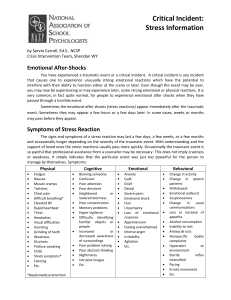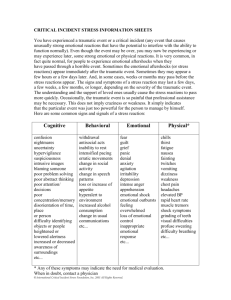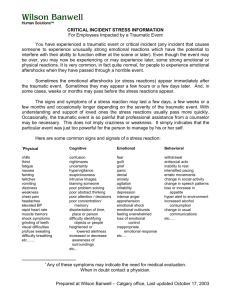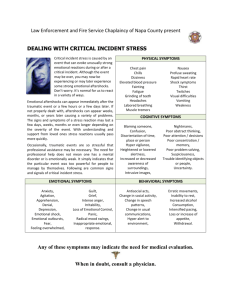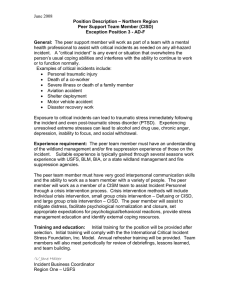PROVIDE SOCIAL SERVICES Provide assistance to an individual workplace
advertisement
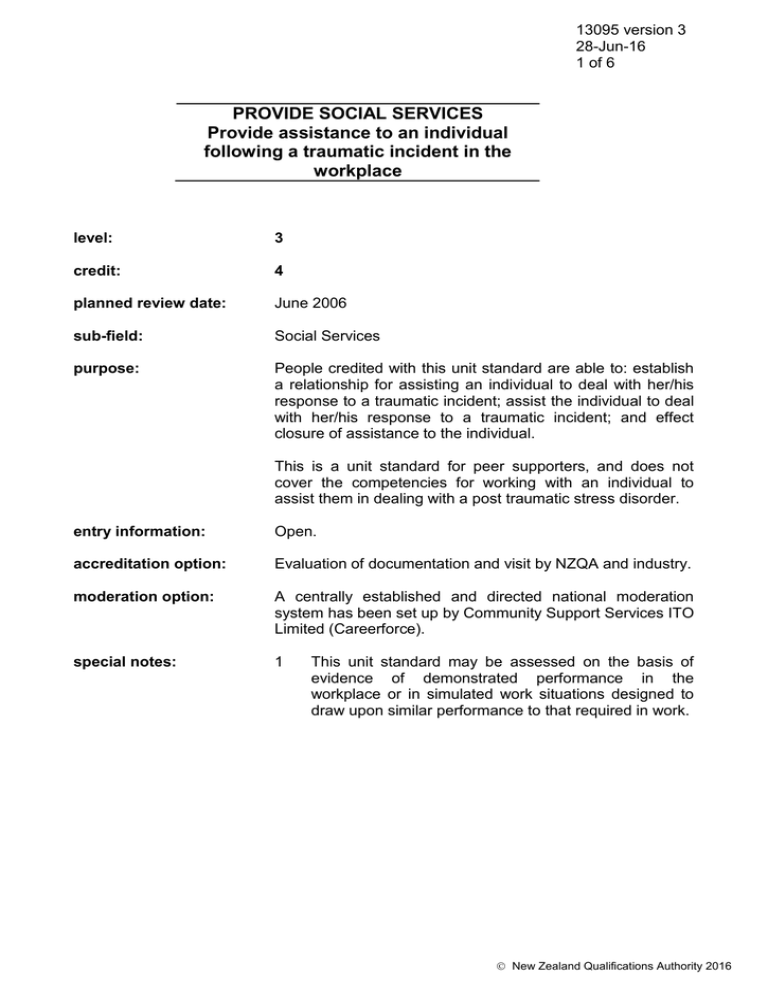
13095 version 3 28-Jun-16 1 of 6 PROVIDE SOCIAL SERVICES Provide assistance to an individual following a traumatic incident in the workplace level: 3 credit: 4 planned review date: June 2006 sub-field: Social Services purpose: People credited with this unit standard are able to: establish a relationship for assisting an individual to deal with her/his response to a traumatic incident; assist the individual to deal with her/his response to a traumatic incident; and effect closure of assistance to the individual. This is a unit standard for peer supporters, and does not cover the competencies for working with an individual to assist them in dealing with a post traumatic stress disorder. entry information: Open. accreditation option: Evaluation of documentation and visit by NZQA and industry. moderation option: A centrally established and directed national moderation system has been set up by Community Support Services ITO Limited (Careerforce). special notes: 1 This unit standard may be assessed on the basis of evidence of demonstrated performance in the workplace or in simulated work situations designed to draw upon similar performance to that required in work. New Zealand Qualifications Authority 2016 13095 version 3 28-Jun-16 2 of 6 PROVIDE SOCIAL SERVICES Provide assistance to an individual following a traumatic incident in the workplace 2 Glossary Characteristics and needs of the individual may be physical, spiritual, or mental. Characteristics and needs include the individual's age and stage of development, culture, gender, health status including any disability, language, sexual orientation, and needs for physical comfort, safety, and privacy. Competence in this unit standard is that of a peer supporter of the individual who experienced the traumatic incident, rather than that of a trained counsellor. Critical Incident Stress refers to severe stress which causes an emotional or physical reaction to demands or pressures which are sudden, unexpected, and due to a specific incident or series of incidents. For the purposes of this unit standard, the term culture has a specific meaning. In this context, culture includes but is not limited to: a culture defined in terms of age, class, disabilities, gender, sexual orientation, socioeconomic situation, or ethnicity, including identification with a culture through birth, adoption, genealogy or whakapapa. Culture also includes the culture of the organisation within which the individual was working. Individual is used as a generic term to denote the person who experienced the traumatic incident. Peer support is a formalised process in which a trained supporter from the work group provides immediate assistance to a colleague or workmate who has been subjected to a stressful traumatic incident. Trauma - a psychological trauma is an emotional state of discomfort due to an extraordinary stressful event or situation, which was overwhelming for the person involved. New Zealand Qualifications Authority 2016 13095 version 3 28-Jun-16 3 of 6 PROVIDE SOCIAL SERVICES Provide assistance to an individual following a traumatic incident in the workplace Traumatic (Critical) Incident Intervention is a procedure in which assistance is provided to someone affected by a traumatic incident. Peer support is generally seen as an intervention measure. 3 All communications are treated confidentially. The scope and limits of confidentiality are defined through negotiation and informed consent, and criteria established by legislation, ethical practice, and service provider guidelines. In the context of this unit standard, sources of criteria established by legislation, ethical practice, and service provider guidelines include but are not limited to: Official Information Act 1982, Privacy Act 1993, service provider codes of conduct, codes of practice issued by the Privacy Commissioner, social service codes of ethics, and service provider guidelines, protocols, staff manuals, strategic plans, kawa, or tikanga. 4 References Mitchell, J. T.; and Everly, G. S. Jr.; 1996. Critical incident stress debriefing: An operations manual for the prevention of traumatic stress in disaster workers. Ellicott City, MD: Chevron Publishing. Robinson, R. and Murdoch, P. 1996 (Nov). Position statement and standards of practice for psychological debriefing and defusing in emergency services. Melbourne, Australia: Victorian Combined Emergency Services Critical Incident Stress Advisory Committee. New Zealand Qualifications Authority 2016 13095 version 3 28-Jun-16 4 of 6 PROVIDE SOCIAL SERVICES Provide assistance to an individual following a traumatic incident in the workplace Elements and Performance Criteria element 1 Establish a relationship for assisting an individual to deal with her/his response to a traumatic incident. performance criteria 1.1 The environment that is established for assisting the individual attends to the characteristics and needs of the individual. 1.2 The individual is engaged in the relationship according to her/his characteristics and needs, and in accordance with the peer supporter's role, function, and any legal responsibilities. element 2 Assist the individual to deal with her/his response to a traumatic incident. performance criteria 2.1 Interpersonal skills maintain a purposeful relationship with the individual, and respond to the situation and the concerns and needs of the individual. 2.2 The individual is assisted to identify achievable options to address her/his response to the traumatic incident. Range: options may include but are not limited to - assistance through active listening, providing information, referral to other services. New Zealand Qualifications Authority 2016 13095 version 3 28-Jun-16 5 of 6 PROVIDE SOCIAL SERVICES Provide assistance to an individual following a traumatic incident in the workplace 2.3 The peer supporter's behaviours focus on supporting the individual to discuss and deal with her/his response. Range: 2.4 peer supporter's behaviours - calm, self assured, thoughtful, warm, show emotion, not overwhelmed by the circumstances of the traumatic incident. The timing of the intervention is in accordance with operational priorities in the work situation and the individual's circumstances. element 3 Effect closure of assistance to the individual. performance criteria 3.1 The closure process identifies issues for further communication and action according to operational priorities in the work situation and the individual's circumstances. 3.2 Closure is effected in terms of completion of the peer supporter's role in providing assistance to the individual. 3.3 Reflection by the peer supporter on her/his actions identifies that the peer supporter understands the role they played in the outcome of the intervention. New Zealand Qualifications Authority 2016 13095 version 3 28-Jun-16 6 of 6 PROVIDE SOCIAL SERVICES Provide assistance to an individual following a traumatic incident in the workplace Comments to: Careerforce PO Box 2637 Wellington 6140 Please Note: Providers must be accredited by the Qualifications Authority before they can offer programmes of education and training assessed against unit standards. Accredited providers assessing against unit standards must engage with the moderation system that applies to those unit standards. [Please refer to relevant Plan ref: 0222] New Zealand Qualifications Authority 2016
